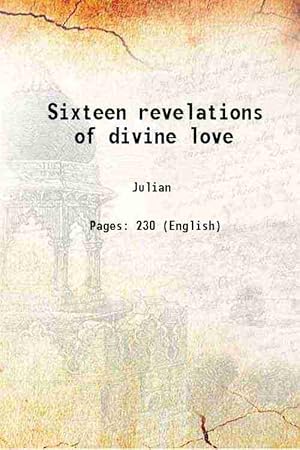

According to her, her visions came in fulfillment of three petitions of her youth: to have in mind the Passion of Christ, to have a critical bodily sickness at 30 years of age, and to receive the wounds of "true contrition," "genuine compassion," and "sincere longing for God." The revelations consist mostly of visions of the crucified Christ occasioned by the sight of a crucifix which the priest had left at her bedside. Julian's revelations, a mixture of imaginary and intellectual visions, bear all the characteristics of true mysticism. A woman of little formal education - she calls herself "unlettered" - Julian writes in a beautifully simple style and shows a solid grasp of traditional theology. Anchorite seclusion was a rather common form of life in 14th-century England among Christians with high spiritual aspirations.

When she wrote her Revelations, she was a recluse at Norwich, supported by the Benedictine convent of Carrow.

After she had been administered extreme unction, she received 16 revelations within the span of a few hours. In her Revelations of Divine Love Julian relates that in May 1373, when she was 30 years old, she suffered a serious illness. Her spirituality is strongly Trinitarian and basically Neoplatonic. Julian of Norwich was the most important English mystic of the 14th century. An introduction, notes and appendices help to place the works in context for modern readers. This edition of the Revelations contains both the short text, which is mainly an account of the 'showings' themselves and Julian's initial interpretation of their meaning, and the long text, completed some twenty years later, which moves from vision to a daringly speculative theology.Įlizabeth Spearing's translation preserves Julian's directness of expression and the rich complexity of her thought. Written in a vigorous English vernacular, the Revelations are one of the most original works of medieval mysticism and have had a lasting influence on Christian thought. Through these 'showings', Christ's sufferings were revealed to her with extraordinary intensity, but she also received assurance of God's unwavering love for man and his infinite capacity for forgiveness. One of the first woman authors, Julian of Norwich produced in Revelations of Divine Love a remarkable work of revelatory insight, that stands alongside The Cloud of Unknowing and Piers Plowman as a classic of Medieval religious literatureĪfter fervently praying for a greater understanding of Christ's passion, Julian of Norwich, a fourteenth-century anchorite and mystic, experienced a series of divine revelations.


 0 kommentar(er)
0 kommentar(er)
